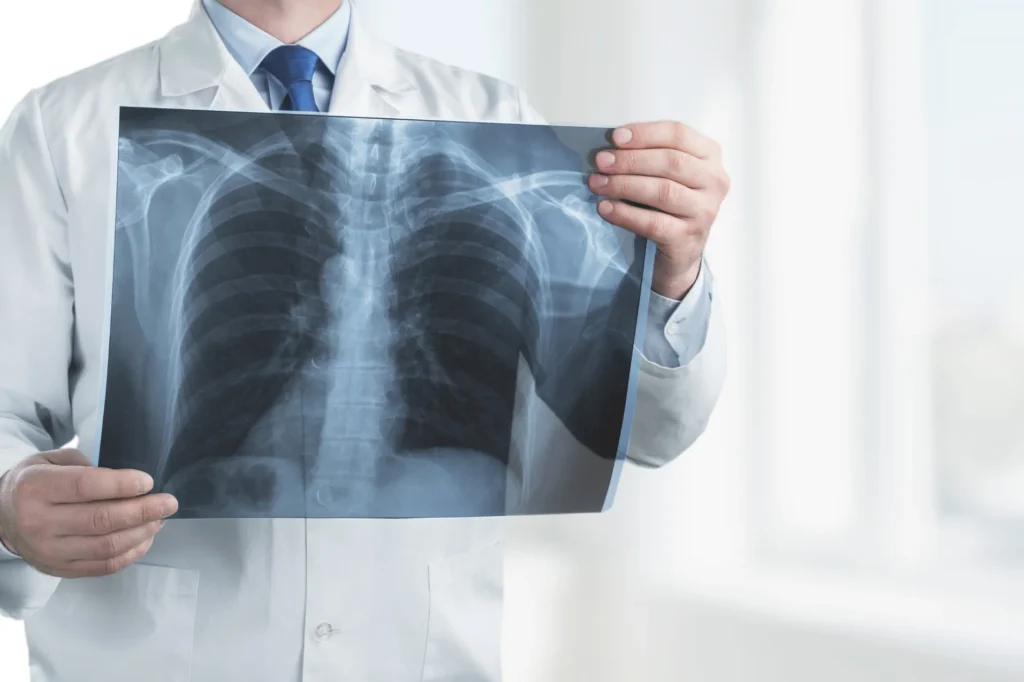Understanding COPD
Chronic Obstructive Pulmonary Disease (COPD) affects over 250 million people worldwide, yet many cases remain undiagnosed. This progressive lung condition encompasses several disorders, primarily chronic bronchitis and emphysema, that obstruct airflow and make breathing increasingly difficult. The condition develops when inflammation and damage occur in the airways and air sacs of the lungs, leading to restricted breathing patterns and decreased lung function.
Common Causes and Risk Factors
While smoking remains the primary cause of COPD, accounting for about 85% of cases, other factors can lead to its development. Understanding these risk factors helps identify potential warning signs early:
- Long-term exposure to secondhand smoke
- Workplace exposure to chemicals, dust, and fumes
- Regular contact with air pollution
- Genetic factors, including alpha-1 antitrypsin deficiency
- Chronic respiratory conditions and infections
- Advanced age, particularly over 40 years

Recognizing COPD Symptoms
Chronic Obstructive Pulmonary Disease (COPD) often develops gradually, with symptoms appearing slowly over time. This gradual onset can make early detection challenging, as many people attribute early symptoms to aging or lack of exercise. Key symptoms include:
- Persistent cough with mucus production
- Progressive shortness of breath, especially during activity
- Wheezing or whistling sound while breathing
- Chest tightness or discomfort
- Frequent respiratory infections
- Decreased energy levels
- Difficulty completing daily activities
COPD Diagnosis Process
Early diagnosis of COPD leads to better outcomes and more effective treatment options. Pensacola Lung Group uses several diagnostic tools to evaluate lung function and confirm COPD:
- Comprehensive medical history review
- Physical examination focusing on lung function
- Pulmonary function testing (PFTs) to measure breathing flow and capacity
- Chest imaging through X-rays or CT scans
- Blood gas analysis when necessary
- Exercise tests to evaluate oxygen levels during activity

Treatment Approaches for COPD
While Chronic Obstructive Pulmonary Disease (COPD) has no cure, modern treatment methods can effectively manage symptoms and improve quality of life. Treatment plans at The Lung Group are personalized for each patient, considering their specific symptoms, disease stage, and lifestyle needs.
Medication Management
Prescription medications form the cornerstone of COPD treatment. Different types of medications work together to help patients breathe easier:
- Short-acting bronchodilators for quick symptom relief
- Long-acting bronchodilators for daily maintenance
- Inhaled corticosteroids to reduce airway inflammation
- Combination inhalers that include both bronchodilators and steroids
- Oral medications for severe symptoms or exacerbations
Pulmonary Rehabilitation
Pulmonary rehabilitation provides a structured approach to improving lung function and overall health. This comprehensive program includes:
- Supervised exercise training tailored to individual capabilities
- Breathing technique education
- Nutritional counseling
- Disease management strategies
- Energy conservation methods
- Emotional and psychological support
Oxygen Therapy
Supplemental oxygen can significantly improve the quality of life for patients with low blood oxygen levels. Modern oxygen delivery systems offer:
- Portable oxygen concentrators for mobility
- Home oxygen systems for nighttime use
- Liquid oxygen systems for high-flow needs
- Emergency backup systems for power outages
Lifestyle Modifications
Success in managing COPD often depends on making sustainable lifestyle changes:
- Smoking cessation programs with medication and counseling support
- Regular exercise routines adapted to breathing capacity
- Dietary adjustments to maintain healthy weight
- Stress management techniques
- Sleep hygiene improvements and evaluation for sleep apnea
- Environmental modifications to reduce triggers
- Management of complicated disease states such as allergies and GERD
Preventive Care
Preventing COPD exacerbations and complications is crucial for long-term health:
- Annual flu vaccinations
- Pneumonia vaccines, as recommended
- Regular check-ups to monitor lung function
- Early intervention for respiratory infections
- Air quality monitoring and management
- Trigger avoidance strategies
Advanced Treatment Options
For severe cases or when standard treatments prove insufficient, Pensacola Lung Group can explore advanced options:
- Clinical trial participation when appropriate
- Evaluation for surgical interventions
- Lung volume reduction procedures
- Referrals for lung transplant assessment
- Advanced breathing support devices
Early intervention and consistent management are key to successful COPD treatment. At Pensacola Lung Group, we work closely with patients to develop and adjust treatment plans as their needs change. Regular monitoring and open communication help ensure treatments remain effective and properly managed.
Remember, COPD treatment is not one-size-fits-all. Your healthcare team will work with you to find the right combination of treatments to help you breathe easier and maintain an active lifestyle. Schedule an appointment with Pensacola Lung Group to discuss the best treatment approaches for your situation.
Living with COPD
Living with COPD requires adapting to a new normal, but with proper strategies and support, you can maintain an active and fulfilling life. Pensacola Lung Group helps patients develop effective approaches for managing their condition while focusing on quality of life and independence.
Daily Management Strategies
Creating a structured daily routine helps control COPD symptoms and reduces stress about managing the condition. Start by establishing consistent times for medications and breathing exercises. Planning your day around energy levels helps preserve strength for essential activities, while regular symptom monitoring allows you to spot potential issues early.
Essential daily management tasks include:
- Taking medications at scheduled times
- Performing prescribed breathing exercises
- Monitoring and recording symptoms
- Checking air quality conditions
- Maintaining proper hydration
Home Environment Optimization
Your home environment plays a crucial role in managing COPD symptoms effectively. Good air quality is essential, so consider installing air purifiers in rooms where you spend the most time. Proper ventilation and humidity control can significantly impact breathing comfort.
Create a living space that supports easy movement and reduces physical strain. Organize your home so that frequently used items are easily accessible, and consider removing obstacles that might make movement more challenging. A clean, dust-free environment with minimal irritants can help reduce COPD symptoms and prevent exacerbations.
Energy Conservation Techniques
Learning to conserve energy throughout the day helps you accomplish necessary tasks without excessive fatigue. This doesn’t mean limiting activity – instead, it means being strategic about using your power. Break large tasks into smaller, manageable segments and plan rest periods between activities. Listen to your body and pace yourself according to your energy levels.
Consider which daily activities require the most effort and look for ways to modify them. Simple changes, like sitting instead of standing while preparing meals or doing laundry on smaller loads, can significantly affect energy conservation.
Exercise and Physical Activity
Regular physical activity remains crucial for maintaining lung function and overall health. Start slowly with activities you can manage comfortably, such as short walks, and gradually increase duration as your stamina improves. Incorporating gentle exercises focusing on breathing and flexibility, such as tai chi or specific pulmonary rehabilitation movements, can help maintain strength without overexertion.
Pay attention to your oxygen levels during activity and use pursed-lip breathing techniques when needed. Working with a physical therapist or pulmonary rehabilitation specialist can help you develop an exercise routine that matches your capabilities and goals.
Nutrition and Emotional Well-being
Proper nutrition is vital in managing COPD symptoms and maintaining energy levels. Focus on eating smaller, more frequent meals to avoid feeling overly full, which can make breathing more difficult. Choose nutrient-rich foods that support overall health and maintain a healthy weight for easier breathing.
Building a solid emotional support network is equally important for managing COPD. Stay connected with family and friends, and consider joining support groups where you can share experiences with others who understand your challenges. Pensacola Lung Group can help connect you with local support resources and counseling services.

Emergency Preparedness and Healthcare Partnership
Developing a clear plan for managing COPD exacerbations provides peace of mind and ensures quick action when needed. Work with your healthcare provider to create an action plan that outlines:
- Steps to take when symptoms worsen
- When to use rescue medications
- Signs that indicate the need for emergency care
- Emergency contact information
- Backup plans for power outages
Regular communication with our healthcare team ensures your treatment plan remains effective and adjusts to your changing needs. Attend scheduled appointments, report any changes in symptoms promptly, and stay current with recommended and preventive care.While COPD presents daily challenges, implementing these management strategies can help maintain independence and quality of life. Pensacola Lung Group provides ongoing support and education to help you navigate life with COPD successfully. Schedule an appointment to discuss how we can help you develop a comprehensive plan for daily living that fits your lifestyle and needs.



